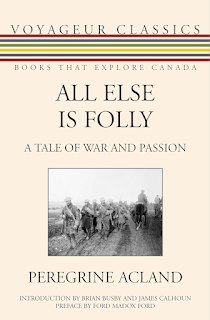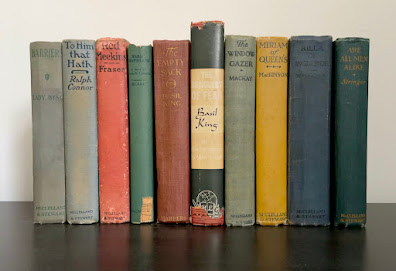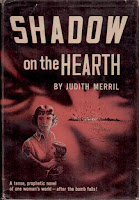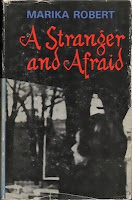I'm right now reading Thomas Jerome Seabrook's
Bowie in Berlin, a book that has nothing at all to do with Canadian literature. The next up on deck is
The Great Gatsby, which I'm in the habit of rereading every three, four or five years. Given this busy season, it's doubtful that I'll read another Canadian book before year's end. And so, the time has come for my annual reading obit, beginning with the three out-of-print books most deserving of reissue:
The Thread of Flame
Basil King
New York: Harper, 1920
The first novel the reverend wrote after the Armistice, this is the story of a man who, suffering from shell shock, loses his identity and memory. Essential reading for anyone studying the depiction of PTSD in literature.
The Empty Sack
Basil King
New York: Harper, 1921
A tale of two families, both trying to make sense of the post-Great War world. Murder features, rather unexpectedly. I dare not spoil, but I have reason to think that it influenced Ben Hecht's
The Front Page.
Blencarrow
Isabel Mackay
Toronto: Allen, 1926
The last of five novels penned by a woman known more commonly as Isabel Ecclestone Mackay, its depiction of failed promise and domestic abuse had me wondering how it is that she is so forgotten.
Between this blog and my
Canadian Notes & Queries column, I read and reviewed twenty-five forgotten and/or neglected Canadian books this year, five of which are actually in print:
It's rare that I let a year go by without tacking a Grant Allen novel.
Miss Cayley's Adventures is one of the most popular, but not with me. Oh, I liked it well enough... but there are much better. In the midst of reading the novel I posted a list of
my ten favourite Grant Allen novels. Revising that list, I would place
Miss Cayley's Adventures at number eight, between
The British Barbarians and
Recalled to Life.
What fun! Last year, Robert Barr's
Revenge! made my list of three books most deserving of a reprint.
The Triumphs of Eugène Valmont would've been a shoe-in for this year had it not been available from the good folks at Gaslight Crime of Harpenden, Herts. Their edition features "The Adventures of Sherlaw Kombs" and "The Adventure of the Second Swag," two Sherlock Holmes parodies not included in the original. The most entertaining read this year.
The Invisible Worm, Margaret Millar's 1941 debut had been long beyond both my financial reach and that of Ontario's interlibrary loan system. At long last, I was able to read it thanks to Syndicate Books'
Collected Millar. Or is it called
The Complete Margaret Millar? Either way, I'm appreciative. Collectors should take note that a copy of the first UK edition (above left), published in 1943 by John Long, is still available from Dacobra Books, Belleville, NSW, Australia. Price: US$520.
The Lively Corpse is
Rose's Last Summer under another name
. Margaret Millar's tenth novel, it closes
The Dawn of Domestic Suspense, the second volume in the
Collected Millar. The third volume is titled
The Master at Her Zenith. This is Millar ascending.
The author's second novel,
The Box Garden was published fifteen years before
The Stone Diaries made her a household name. I'm embarrassed to admit – yet I must admit – that it is the only Carol Shields novel I've ever read. On the other hand, does her work really have a place in a blog devoted to forgotten, neglected, and suppressed writing?
This year I was involved in returning John Buell's
Four Days to print. The author's second novel, it isn't so well known as his debut,
The Pyx, but I think it is his best (and here I acknowledge that I haven't yet read his 1976 novel
Playground). A
Ricochet Book from
Véhicule Press, the new edition features an introduction by Trevor Ferguson (aka John Farrow).
I didn't publish a book this year, but did contribute a few photos, ticket stubs, and a handbill to my friend Jim Dooley's
Red Set: A History of Gang of Four. This is what comes from being a pack rat.
Praise this year goes to American Frank L. Packard scholar Michael Howard, who has begun reissuing the Jimmie Dale/Grey Seal novels in annotated editions.
The next, featuring
The Further Adventures of Jimmie Dale and
Jimmie Dale and the Phantom Clue, will be released in the New Year. True labours of love, they can be purchased through American online booksellers.
Resolutions, I have a few:
- I resolved last year to read more books by women. And I did! Eleven of the twenty-five I reviewed were by women writers. Let's see if I can't improve on that number.
- I resolved last year to read more books by French language writers... and failed miserably. What I'd thought was an all-time low in 2017 – one! – was surpassed with a zero count in 2018. I hang my head in shame.
- I resolve to finish one of the two books I'm currently writing.
- Finally, as always, I resolve to continue kicking against the pricks.
How 'bout you?
Related posts:
























































